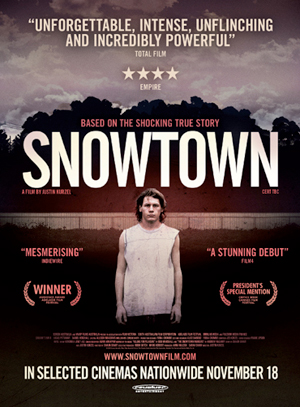LFF 2011: Snowtown ****
 Believe the stories of disturbed audience members leaving various screenings – there were a few hurried departures when we saw this film at this year’s London Film Festival. Debut feature writer-director Justin Kurzel has co-penned a gripping, ‘car-crash’ account based on a true Australian crime story from the 1990s. However, it’s not necessarily the crime that is the most shocking, but the slow and systematic abuse of the family involved.
Believe the stories of disturbed audience members leaving various screenings – there were a few hurried departures when we saw this film at this year’s London Film Festival. Debut feature writer-director Justin Kurzel has co-penned a gripping, ‘car-crash’ account based on a true Australian crime story from the 1990s. However, it’s not necessarily the crime that is the most shocking, but the slow and systematic abuse of the family involved.
Based on the Snowtown murders (August 1992 and May 1999) – also known as the Bodies in Barrels murders – in Snowtown, 145km north of Adelaide, where 11 people lost their lives at the hands of serial killer John Bunting, Kurzel’s story follows the effect Bunting had on one vulnerable and struggling family and its elder son, Jamie (Lucas Pittaway). After being abused by a seemingly friendly neighbour across the street – who takes indecent photos of the boys while having them in his care, concerned and caring Bunting (Daniel Henshall) appears on the scene like the family’s saviour, arranging community meetings to rid the area of its paedophiles and other undesirables, and becoming a compassionate surrogate father to mother Elizabeth’s (Louise Harris) kids, as well as a financially stable partner to her. As his gradual influence on all grows, and Jamie comes to rely more on him as a role model, the young man begins to be drawn into the darker world of Bunting, both emotionally and physically, and has no apparent escape.
Snowtown does not follow conventional, glossy thrillers as such: there are no dramatic build-ups or ringing alarm bells, and no grizzly climaxes. In fact, apart from one horrific torture scene that involves Jamie – as the story is told from his perspective, there is very little gore to witness on camera. It is as though Kurzel has documented an account of the killings with real-life footage taken from the time, and its stark realism is echoed in the film’s limited, even washed-out palette that perpetuates the equally decayed existence of the impoverished environment it is set in.
Like unwilling voyeurs at times, you witness events happening in secret, right in front of you, in a kind of helpless and depressing fashion. The film is prone to confusion in parts as the gloomy interiors and wider shots often make it difficult to establish who is doing what to whom – especially when Jamie is abused at home, for example. What is actually far more alarming is the apparent frequency that family members encounter abuse of all kinds and deal with it in a matter-of-fact way, plus the progressive psychological damage that Bunting inflicts as his true character is gradually revealed. This debilitating acceptance of their fate filters through and immerses you in a deep gloom.
Kurzel toys with our views on vigilantism. At first, we naturally empathise with the plight of the locals, as the ugly truth on their doorstep seems to fester. Like all serial killers, Bunting like Bundy is accommodating, articulate and highly sociable, and no more prejudice or remarkable than his peers. Ironically, one of the townsfolk is a transvestite, and although we know his card is marked by the fascist views of Bunting and co-collaborator – like others who fall into the trap, it is the waiting that simultaneously drains and propels the narrative to that end, in some scenes that could have been shorter. But perhaps it is the subject matter that is so abhorrent that we wish it to end as quickly as possible, a prolonged torture for the viewer even.
Virtual unknowns, Australian TV actor Daniel Henshall as Bunting and acting newcomer Jamie Vlassakis as Jamie have certainly stamped their respective marks with some outstanding performances, and concoct a mesmerizing chemistry – much like watching a twitching fly trapped in a spider’s web of deceit. Vlassakis is a young man lost, blindly sleepwalking his way into peril, and only coming alive with bursts of frustration and anger after realising his quandary. His outbursts are complimented by Henshall’s calm resolve that is full of menace as the disguise evaporates.
Like a brutal coming-of-age drama unfolding, Kurzel’s brilliantly directed and acted Snowtown does not leave your thoughts until long after watching it, as though you carry a guilty at witnessing the abuse. Apart from a little character confusion at times, this oppressive account is one of the most effective and uncompromising horrors of human essence of recent years – a powerful testament to the talents of all involved.
4/5 stars
By @FilmGazer